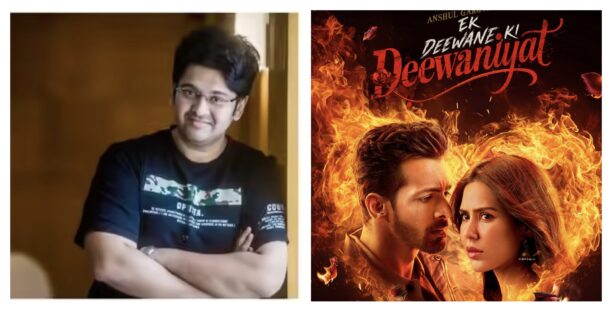 Director Milap Zaveri talking with Subhash K Jha goes into the making of his new film Ek Deewane Ki Deewaniyat, which stars Harshvardhan Rane and Sonam Bajwa, emerging a winner in spite of all odds.
Director Milap Zaveri talking with Subhash K Jha goes into the making of his new film Ek Deewane Ki Deewaniyat, which stars Harshvardhan Rane and Sonam Bajwa, emerging a winner in spite of all odds.
Congratulations, your film has taken on the biggest franchise and emerged a winner, how does that make you feel?
I’m delighted and grateful to audiences for giving so much love to Ek Deewane Ki Deewaniyat, which has emerged a winner despite a clash with such a big franchise film like Thamma. It’s only because of the power of the story that was enacted brilliantly by Harshvardhan Rane and Sonam. And backed so strongly by my producer Anshul Garg. The entire team deserves the success as I couldn’t have achieved this without them. Eventually the film was made from the heart and therefore has won hearts against all odds.
Was it Harshvardhan Rane from the beginning?
The story of Ek Deewane Ki Deewaniyat was written almost seven years ago, and it went through its own share of hurdles and near-misses. Over the years, several names were discussed, but somehow, it never quite aligned — until Harshvardhan came into the picture. The moment I spoke to him, I realised he understood the emotional gravity of the character in a way few actors could. His honesty and intensity made him a natural fit. Looking back, I truly believe this role was meant to be his — it was just waiting for the right time and the right team to come together.
Admittedly,the hero is problematic as he can’t see beyond his own feelings, did you foresee this as being a problem for the audience?
I always knew that Harsh’s character would evoke extreme reactions, but Mushtaq Sheikh, my co-writer, and I worked hard to show the purity behind his madness — to make audiences understand his Deewaniyat. I must give full credit to Harsh for the way he built the character’s emotional layers, especially his backstory with his mother. That small detail really touched a chord with people. The audience has connected deeply with his intensity because of the vulnerability he brought to the role. Even though his character may seem flawed or impulsive, he never crosses a line with Sonam’s character. His love isn’t driven by lust or obsession — it’s rooted in respect, longing, and a deep emotional truth. And I think that’s what has truly worked — people are responding to the sincerity behind his madness.
Ek Deewane Ki Deewaniyat has got scathing reviews but is being appreciated by the audience, do you think there is a lacuna between what works and what critics think should work?
I think there will always be a difference between what connects with audiences and what appeals to critics — and that’s absolutely fine. Both look at cinema through very different lenses. Audiences today are emotional and instinctive; they respond to what touches their heart, while critics tend to analyse films from a more technical or conceptual point of view. As a filmmaker, I value both perspectives. But for me, the real victory is when people buy a ticket, sit in a theatre, and connect with the story. That’s the truest form of validation. Because at the end of the day, cinema is about evoking emotion — if it moves people, entertains them, or makes them feel something real, then I believe it has fulfilled its purpose.
Do you feel vindicated?
I make cinema for entertainment. A reputed director like Hansal Mehta sir congratulated me on social media and people accused him of supporting a toxic film. He gave a fitting reply to his detractors that if cinema could really influence people as strongly then wouldn’t they learn from the positive things cinema shows? My films are meant for masses and for paisa vasool cinema.








